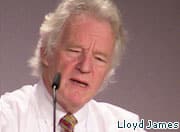A former NHS chief has said efforts should be made to cherish and celebrate older people rather than legalise assisted suicide, after a 75-year-old ended her life at a clinic in Switzerland despite having no terminal illness.
Writing in the Daily Mail, Sir Muir Gray said there is “absolutely no reason why the years after 70 should represent a valley of gloom”.
“In fact, this particular milestone should have no real significance. It is just a number, not a medical condition or a diagnosis.”
Shelf life
Retired nurse Gill Pharaoh hit the headlines this week after she travelled to Switzerland to commit suicide, claiming that an “ideal shelf life for many people is about 70 years”.
But Sir Muir commented: “The very idea that humans have a ‘shelf life’, after which they are ‘past it’ and nothing more than an inconvenience to society, is a profoundly depressing one.”
He added: “It must never become accepted wisdom that old age is going to be a miserable experience. Otherwise we will end up with more pressure for a change in the law”.
Much to give
He also suggested that such a mindset could lead to “the advent of ‘suicide courts’ to decide whether desperately sick patients should be allowed to end their lives”.
Life has so much more to offer even in the midst of difficulties than those who are advocating assisted suicide would have us believe.
Colin Harte
“We must fight tooth and nail to change the system, to improve life for older people, and to convince people to enter their later years in good heart.
“The most appropriate response to the suicide in Switzerland of Gill Pharaoh is not to loosen the law on assisted suicide, but to cherish older generations, to celebrate the years when, for all the aches and pains that go with them, we should recognise that we still have so much to give — and so much to enjoy.”
Life has value
On BBC Radio 4’s Today programme, Pharaoh’s partner John Southall explained that she had been planning her suicide for many years.
But the show also heard from Colin Harte, whose severely disabled friend Alison Davis changed her mind after previously deciding she wanted help to kill herself.
Asked by presenter John Humphrys why Alison chose to live, Harte explained: “Friends had encouraged her to have an understanding that her life had a value.”
Humanity lost
He said she had a will to live “because she wanted to do something for others”, and recognised that “people can do things with their lives even with difficulties”.
Harte said that there was much “humanity” during the last few weeks of Alison’s life, something that he feels is “being lost” in the assisted suicide debate.
He added: “Life has so much more to offer, even in the midst of difficulties, than those who are advocating assisted suicide would have us believe.”
“She was eternally grateful to those who had encouraged her to live.”

